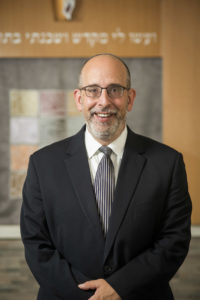A new group is exploring ways to bring Anglos in Israel together to share their perspectives and ideas in order to improve Israeli culture, politics and society.
By David Isaac, World Israel News
The Anglo Vision is a new group that looks to organize Israel’s English-speaking immigrants and perhaps even tap into their unrealized political potential.
The idea is the brandchild of Rabbi David Fine, an Orthodox rabbi who immigrated to Israel from Kansas City 12 years ago and now lives in the city of Modiin with his wife and four children.
The idea came to him from forming an earlier group, the Barkai Center for Practical Rabbinics and Community Development, upon discovering that rabbinical training in Israel focused only on textual knowledge. Barkai offers U.S.-like practical training for Israeli rabbis, including how to work with people, how to counsel others and how to speak publicly.
Through that experience, Fine realized that Anglos have something to offer Israel in other areas of life as well, and so he started a group, The Anglo Vision, to bring Anglos together. It just ran a poll that found 75 percent of Anglos want to organize politically, a fact that caught Israeli politicians’ attention.
Recently, Fine spoke about The Anglo Vision with World Israel News.
Q: First of all, for our readers who may not know, what are “Anglos”?
“That’s interesting because we spent a lot of time with the pollster discussing that. We decided that [Anglos include] people who are foreign from an English-speaking country and English is their mother tongue, or that one of their parents was born in an English-speaking country and English is their mother tongue. But most of the Anglos are people who made Aliyah from Western, English-speaking countries.”
Q: Tell us about your group “The Anglo Vision.” What is its purpose?
“The Anglo Vision’s purpose is to coalesce Anglos in Israel into a more unified group and to unite common principles that more or less everyone could agree to in order to create change in Israel and make Israel even better than it already is.”
Q: Why did you establish the group? Was there something specific?
“I realized in starting my organization [Barkai] that we’re creating a different kind of community, a different kind of rabbi than Israel was used to up to that point. And basically I felt that here was a good idea that came from outside of Israel that, once instituted in Israel, made improvements in Israeli society because Israel doesn’t have the same sense of community that exists outside in Anglo-speaking countries. The point I’m trying to make is that there are ideas that Anglos have and Israelis are not familiar [with], which, if instituted and adopted, could make Israel a better place.
“And my experience has been that Anglos make Aliyah [immigrate to Israel] and they’re very much encouraged to make Aliyah but they don’t really have a say or a voice in the public agenda of where the country’s going, the direction the country’s going, so most Anglos to me seem to sit on the sideline and let other people decide for them. So we’re just trying to lean in and create a venue for Anglos to have more influence in the direction the country is taking.”
Q: Why did you choose that name? What is the “Anglo Vision” in your view?
“More or less what I just said, meaning we want to make change in the country. We wrote an article when we started it back in February that suggested six different ideas that the Anglo community could possibly coalesce around and try to advance with the decisionmakers. It doesn’t necessarily need to be those six ideas. We came up with those six ideas to start a conversation amongst Anglos, mostly online.”
“Our vision is to implement change and some of those ideas that we shared with the Anglo-speaking public.”
[ed. note – among the six ideas including better professional integration for immigrations, better immigrant absorption counseling, fighting the BDS movement and a more representative government.]
Q: Your group was recently in the news for a poll you organized. It found that 75% of Anglos want to organize politically. This is the first poll your group has done, but do you think the desire among Anglos to organize is something new?
“No, I don’t think it’s new. I think it’s probably been a vision for Anglos throughout the country. But no one has ever tried to do what we’re trying to do – to coalesce the Anglo community around united principles. There are probably around 300,000 to 400,000 Anglos in Israel. That’s a large group that could have a certain amount of influence if it decides to unite.”
Q: Do you think it’s a good idea to have another party? Israel has in recent years been trying to reduce the number of parties by raising the electoral threshold.
“We’re at step one of this. We haven’t necessarily decided about the best way to achieve our goals, so I don’t want to comment whether there should be an Anglo political party because we’re still in the early stages of deciding what people think is the best way to go forward. So a lot of work’s to be done to figure that out.”
Q: Have you thought about what an Anglo party would look like? What would be its platform?
“No, I truthfully have not thought about it.”
Q: Has anyone yet attempted to create a specifically Anglo party in Israel?
“I’m unaware of any attempt, though that doesn’t mean there’s hasn’t been.”
Q: Which party has done the best job trying to reach Anglos as Anglos?
“I don’t really think any of the parties are doing a good enough job. If they were including Anglos in their decision-making process, then we wouldn’t necessarily need to be doing what we’re doing. Since people found out about the poll, I’ve been contacted by parties and politicians across the political spectrum because everyone is always interested when they hear large numbers. and so I think many of the parties desire to be able to reach out to Anglos in a better way, but I don’t really think they understand what the best way of doing that is, presently.”
Q: According to the poll, economics is the main issue. What are the main economic issues confronting Anglos?
“We were very surprised that the main issues people were worried about were issues of economics and social welfare. Many Anglos are also interested in a more representative form of government. And it was interesting to us that the issues that take up the most time and get the most coverage really did not fare so well in the poll.”
Q: What do you think would be the main contribution of Anglos to Israel if they did organize politically?
“Anglos bring a different perspective, new ideas, fresh ideas, and they’ve never been really been involved in an organized way politically. so once that happens, there’s no end to what Anglos can contribute to Israel, and Anglos want to contribute. They don’t want to sit on the sidelines.”
Q: Parties appealing to specific communities never performed well in Israel. In 1949, Sephardic lists won four seats in the Knesset. By 1951, it was down to two. The most successful might be Avigdor Liberman’s Israel Beiteinu, but his base of support among Russians has clearly shrunk. Do you think an Anglo party would be any different?
“We’re not interested in creating a virtual ghetto of Anglos. We’re interested in integrating fully as Israelis and being Israelis and being involved in Israeli culture and the economy and all that. We just want to bring our ideas to the table in a more organized fashion. We don’t look to be sectoral. And we’d include anyone who’s interested in advancing our ideas. We just want to have a chance to improve society by bringing a different perspective. That’s all.”
Q: What do you say to Anglos wondering if they should move to Israel?
“I would say I think Israel is the greatest country in the world, and in order to live a full Jewish life l think it’s an ideal place to do that. I would encourage any Jew to make Aliyah.”






